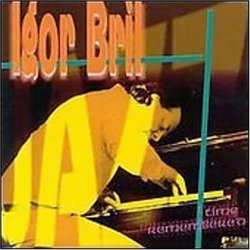| All Artists: Alexander Scriabin, Nikolai Golovanov, Anatoly Orfenov Title: Scriabin: Symphony No. 1 Members Wishing: 1 Total Copies: 0 Label: Boheme Release Date: 7/25/2000 Genre: Classical Styles: Historical Periods, Modern, 20th, & 21st Century, Symphonies Number of Discs: 1 SwapaCD Credits: 1 UPC: 460241081020 |
Search - Alexander Scriabin, Nikolai Golovanov, Anatoly Orfenov :: Scriabin: Symphony No. 1
 | Alexander Scriabin, Nikolai Golovanov, Anatoly Orfenov Scriabin: Symphony No. 1 Genre: Classical
|
Larger Image |
CD Details |
CD ReviewsWhite-Hot and Inspired Thomas F. Bertonneau | Oswego, NY United States | 01/11/2001 (5 out of 5 stars) "The Soviet assimilation of Alexander Scriabin (1872-1915) poses any number of riddles. Why should the fiercely atheistic regime have legitimized the work of so metaphysical - indeed, so theosophical - an artist? Why, when its agents condemned the much less musically radical work of composers like Shostakovich, Profokiev, and Khachaturyan, did it continue to invest so much in the Scriabin-cult? How far was the real context of Scriabin's music replaced by a false context made up to be in conformance with Communist ideology? We know that the Soviet Scriabin-cult began early. In a short-story from the 1920s, Yevgeny Zamyatin depicts a group of Young Pioneers working double-time to finish their detail. The reason? They all have tickets to a Scriabin concert that evening and wouldn't miss it for the world. Scriabin's mortal date, 1915, offers part of the answer. Unlike Rachmaninov and Stravinsky, Scriabin died (in his forties of septicemia caused by an untreated boil on his lip) before history forced him to choose sides. Rachmaninov and Stravinsky did choose sides and their choice made their music anathema in Russia for a long time. Scriabin's esthetic boldness offers another part of the answer. He could with justification be described as a revolutionary in art. Not that his revolutionism had anything whatsoever to do with politics (although like Theosophists generally he favored a milky socialism); but his harmonic audacity and febrile enthusiasm lent themselves to utopian propaganda. Scriabin spoke of recasting the human race in a new form and so did Lenin. The natural observation that what they meant diverged as radically as possible could be deferred by appropriately vague vocabulary. After World War II, and especially with the onset of the "Space Race," Scriabin's music offered a ready-made soundtrack for Sputnik-shots and manned orbital missions. Oddly, the foremost mid-century champion of Scriabin's orchestral music in the Soviet Union was Nicolai Golovanov (1891-1953), whose primary and secondary education took place, before the revolution, in an Orthodox religious setting. Record collectors have recently begun to rediscover Golovanov's art as his old recordings get recycled into the CD market. Golovanov, who specialized in over-the-top performances of late-Romantic repertory, meshed perfectly with Scriabin, who benefits from a certain degree of Dionysiac participation. Golovanov can thus take the First Symphony (1900), sprawling in post-Tchaikovskian languor over six movements (the last one with chorus), and infuse it with a yearning energy that magically salvages the rough spots and makes the whole thoroughly convincing. The "hard-edged" sound of the Large Symphony Orchestra of Russian State Radio and Television, with blaring trumpets and metallic strings cavernously recorded in the late 1940s, actually helps the performance. Digital silkiness has not, in my opinion, served Scriabin as well as it might have - it too much softens the musical steeliness and too much dampens the psychotropic fire. Well, there's none of that here, although let it be said that the remastering engineers have brought out an incredible depth and detail from the 78rpm Melodiya matrices. Golovanov's interpretation of Glazunov's Seventh from about the same time has recently appeared on a Pearl CD; it has hardly any dynamic variation at all. By contrast, this Scriabin First Symphony both whispers and fulgurates. This recording brings back to me the enthusiasm that I felt when I first started to listen to Scriabin as a college student at UCLA in the early 1970s. I'd sit with friends of a Saturday night in my seedy, smoke-choked room with the volume of my cheap record-player (with two low-fi speakers to simulate stereo) turned up loud. Slava Golovanov! Slava Scriabin!"
|

 Track Listings (6) - Disc #1
Track Listings (6) - Disc #1